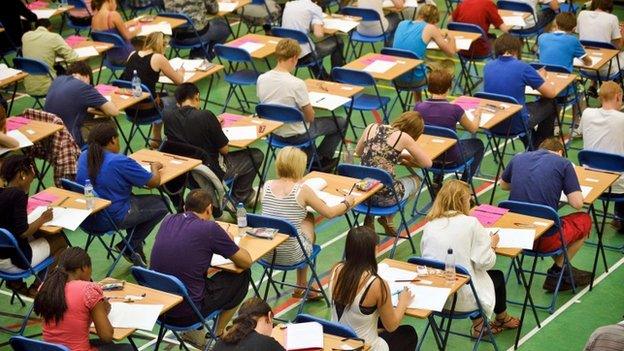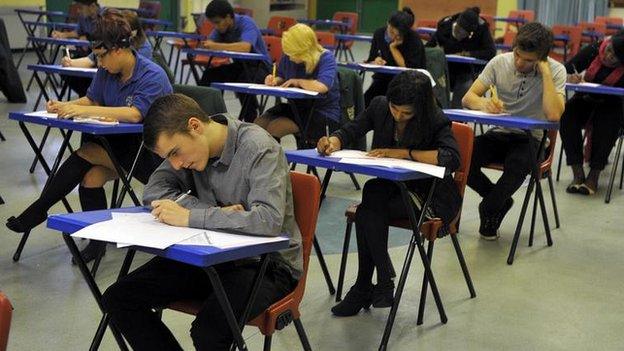More than 90,000 exam grades changed
- Published

Record numbers of grades have been changed after re-marking
More than 90,000 GCSE and A-level results were changed after challenges to grades awarded this summer - the highest on record and an increase of 17% compared with last year.
Exam regulator Ofqual says there were more than 572,000 queries over grades - an increase of 27%.
Head teachers have complained about the quality of marking and the damaging impact of incorrect grades.
Ofqual is launching a consultation to overhaul the appeals system.
The annual figures from Ofqual show another significant increase in exam papers sent back for being re-marking and grades changed at both A-level and GCSE in England, Wales and Northern Ireland.
Appeals against results meant that 62,000 grades were changed at GCSE and 28,500 at A-level.
The number of grades changed after re-marking has almost doubled in three years. In 99% of cases, it was an upwards change.
'Creaking'
Brian Lightman, leader of the ASCL head teachers' union, said these exam results are of "critical importance to the future of young people".
"We have warned for some time that the marking system is under huge pressure and fear that the increase in re-grades strongly suggests it is creaking under the strain."
"Every child sitting an exam deserves to trust that their paper will be marked accurately. So it is very disappointing to see yet another huge upsurge in false GCSE and A level grades," said Chris King, chair of the Headmasters and Headmistresses Conference group of independent schools.
"The implications for pupils are grave - for some it has meant they have wrongly missed out on a place at their preferred sixth form, further education college or university of choice."
But Mr King said the "true statistics are likely to be even higher, as we know many state schools do not have the time and resources to put in lengthy, complicated and expensive appeals".
Cost of re-marks
There have been warnings from head teachers' leaders that because of the cost of re-marking, fewer appeals are likely from state schools.
Figures from the OCR exam board published by the BBC earlier this year showed that independent school exam centres accounted for a disproportionate number of inquiries.
But the analysis from Ofqual does not provide an official breakdown of state and independent school challenges to grades - or how much the process costs schools and parents.
Exam boards refund the re-marking fee if an exam is changed - but not if the grade remains the same, with fees costing between about £20 and £60 per paper.
This year's figures show more than 480,000 grades were not changed, representing millions of pounds of expense.
The most common result challenged at GCSE was a D grade - reflecting the importance of getting across the C grade threshold. At A-level, the most challenges were for B grades, suggesting it could relate to university applications.
Figures published on Thursday also showed that 2,460 exam candidates faced penalties for cheating this year, fewer than last year. But penalties for teachers caught cheating, such as giving unfair help to pupils in exams, more than doubled to 262.
Appeal changes
The Joint Council for Qualifications, representing exam boards, said only a small proportion of exam grades had been found to need changing, in a system with 50,000 markers and 15 million individual scripts.
"As data published today by Ofqual shows, each year over 8 million GCSE and A level grades are awarded to a high level of accuracy. Although the number of enquiries about results increased in 2015, the proportion of all grades changed was 1.1%," said the JCQ's director general Michael Turner.
Ofqual has launched a consultation into ways of improving the process of querying results.
It will address concerns such as a "lack of transparency in the system", the time taken to process appeals and the cost to schools and candidates.
The proposals include marks only being changed if an examiner has made an error in applying the marking scheme, or adding up the marks.
This would mean that if there was a difference in academic judgement between the original marker and a second examiner carrying out a re-mark, the original mark would stand.
Ofqual chief Glenys Stacey said: "This year we have seen another increase in appeals.
"Schools want to do the best for their students, which is understandable given the importance of GCSE, AS and A-level grades on their future prospects, but it also reflects teachers' increasing lack of confidence in marking and the current appeals system.
We believe the evidence-based proposals put forward today will improve transparency and fairness."
- Published14 October 2015

- Published14 October 2015